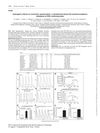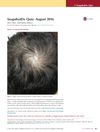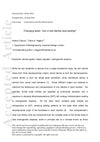
Male pattern baldness is a common hair loss in men caused by genetics and hormones, with treatments including drugs, hair transplants, and hair loss products.

Padina arborescens and its component MOGG may help prevent hair loss through several actions, including blocking a hair loss-related enzyme.
 October 2019 in “European heart journal”
October 2019 in “European heart journal” Androgen-deprivation therapies increase the risk of certain heart conditions, but testosterone treatment may help.
 September 2019 in “Journal of Investigative Dermatology”
September 2019 in “Journal of Investigative Dermatology” BMPs are important for hair growth and can counteract the negative effects of androgens on hair follicle stem cells.
 April 2019 in “Journal of Investigative Dermatology”
April 2019 in “Journal of Investigative Dermatology” Testosterone affects androgen receptors and lipid storage in cells, while DHEA does not convert to testosterone or affect these receptors in the same way.
April 2019 in “Journal of the Endocrine Society” Androgens and estrogens are crucial for insulin secretion in males.
April 2019 in “Journal of the Endocrine Society” A 12-year-old boy with PAIS successfully developed male characteristics using high-dose testosterone and anastrozole.
 January 2019 in “Oncogen”
January 2019 in “Oncogen” Triple Hormonal Blockade (ADT3) can effectively manage prostate cancer but requires careful monitoring for heart risks.

Changes in skin bacteria can affect hair loss and new treatments targeting these bacteria may prevent balding without sexual side effects.

Ostrich antibodies can help restore hair growth in people with a specific type of hair loss, increasing hair count by 71% on average.
 January 2019 in “International Journal of Pharmacognosy and Clinical Research”
January 2019 in “International Journal of Pharmacognosy and Clinical Research” Mexican medicinal plants are used to treat hair loss.
Endurance exercise may help BPH by lowering hormones and inflammation.
 December 2018 in “Actas urológicas españolas”
December 2018 in “Actas urológicas españolas” 5-alpha reductase inhibitors may have additional effects on cancer, mental health, heart health, and hormone levels beyond treating prostate enlargement.
October 2018 in “Elsevier eBooks” Saw Palmetto is a safe and effective natural remedy for treating benign prostatic hyperplasia (BPH).
 April 2018 in “The journal of investigative dermatology/Journal of investigative dermatology”
April 2018 in “The journal of investigative dermatology/Journal of investigative dermatology” Androgens increase growth factors in skin cells, which may lead to acne.
 January 2018 in “Journal of translational science”
January 2018 in “Journal of translational science” Eating alfalfa sprouts every day can raise testosterone levels in middle-aged men, but broccoli sprouts don't have this effect.
 January 2018 in “Elsevier eBooks”
January 2018 in “Elsevier eBooks” The document explains how male reproductive hormones work and affect the body.
January 2018 in “Elsevier eBooks” 5α-reductase-2 deficiency causes ambiguous genitalia at birth and affects male sexual development, but individuals often develop male characteristics at puberty.
 January 2018 in “Surgical and Cosmetic Dermatology”
January 2018 in “Surgical and Cosmetic Dermatology” Finasteride and dutasteride are effective for male hair loss and enlarged prostate but may cause reversible sexual side effects.
Male hormones can decrease the ability of immune cells to fight bacteria.
 September 2017 in “Journal of Investigative Dermatology”
September 2017 in “Journal of Investigative Dermatology” Researchers created human cells that can turn into sebocytes, which may help study and treat skin conditions like acne.
 September 2017 in “Pediatric Dermatology”
September 2017 in “Pediatric Dermatology” A 14-year-old boy was diagnosed with a rare hair condition that may lead to hair thinning and has no known effective treatments.

Crinum asiaticum extract and norgalanthamine may promote hair growth by blocking an enzyme linked to hair loss and a pathway that stops hair growth.
 January 2017 in “Indian journal of drugs in dermatology”
January 2017 in “Indian journal of drugs in dermatology” Saw palmetto extract may help with hair loss and acne but needs more research on safety and long-term effects.
 July 2016 in “Journal of Investigative Dermatology”
July 2016 in “Journal of Investigative Dermatology” Balding scalps show different gene expressions affecting hair growth compared to non-balding scalps.

Female hair loss is often hereditary and can be treated with medication, hair transplants, and lasers.
 June 2016 in “Experimental Dermatology”
June 2016 in “Experimental Dermatology” Changing hair follicle identity could potentially reverse balding.

Modern hair restoration techniques can effectively treat hair loss and provide natural-looking results.
January 2016 in “프로그램북(구 초록집)” Hormones and neuropeptides affect hair growth, with androgens having opposite effects on beard and scalp hair.
 December 2015 in “Вестник дерматологии и венерологии”
December 2015 in “Вестник дерматологии и венерологии” Men with male pattern baldness may not have different hormone levels, but their hair follicles are likely more sensitive to hormones.























